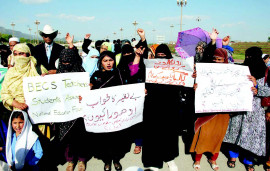
The acting head of the Higher Education Commission (HEC), Syed Imtiaz Hussain Gilani, expressed these fears to The Express Tribune during an interview on Tuesday. He vowed to take the commission back to the old glory, following the footsteps of its founding chairperson Prof Dr Attaur Rehman.

As Gilani was meeting all the stakeholders of the higher education sector across the country, a three-member bench of the Supreme Court directed the government on Wednesday to appoint a regular chairperson of the commission within 15 days. The apex court stressed that no acting appointment can be made on a regular post.
It remains, however, to be seen if 65-year-old Gilani - who has also been serving as the vice-chancellor of the University of Engineering and Technology in Peshawar since 2004 — will continue to head the commission or get replaced by someone else.
But while he holds the post, Gilani wants to do all that he can to make sure HEC’s standards are not compromised. The Supreme Court had already given an observation that the HEC was a federal subject and cannot be devolved to provinces, he pointed out.
On February 21, the Sindh Assembly had, however, passed a law — the Sindh Higher Education Commission Act 2013 — to set up its own provincial body, for which the chief minister will be the controlling authority. The provincial commission was given all the powers, including the authority to verify degrees awarded by any institution in the world.
Meanwhile, former chairpersons of the commission, including Dr Rehman and Dr Javaid Laghari, had expressed concerns from time to time about the government’s apparent intervention in the affairs of an ‘autonomous body’. Dr Rehman, while talking to The Express Tribune, had even declared the law to establish a provincial commission a move to avoid the verification process of the lawmakers’ degrees, which the federal HEC had started on the orders of the election commission.
Gilani explained that after the 18th Amendment, the then Pakistan Peoples Party-led government clarified before the three-member bench headed by Chief Justice Iftikhar Muhammad Chaudhry that the status of HEC, as it has been assigned to it under HEC Ordinance 2002, shall remain intact unless it is changed by promulgation of some legislation.
Such legislation, he said, must have been done at the federal level as the attorney general on behalf of the government had accepted before the apex court that the government notification of March 31, 2011, regarding devolution of the functions and authorities to the provinces, shall have no effect on the functioning of the HEC.
“In case of any conflict between a provincial law and the provisions of the [HEC] ordinance, the ordinance has to prevail,” he added.
Meanwhile, Dr Rehman, and Pakistan Muslim League — Nawaz’s lawmaker, Marvi Memon, had also taken the provincial government to the Sindh High Court, asking a restrain on the establishment of the proposed commission by declaring it unlawful and unconstitutional. The court has, however, yet to give its verdict.
Published in The Express Tribune, November 29th, 2013.



































COMMENTS
Comments are moderated and generally will be posted if they are on-topic and not abusive.
For more information, please see our Comments FAQ